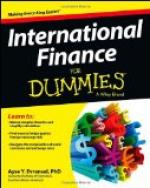Hence it is that when some of those who question the right of capital to its reward, do so on the ground that capital is often acquired by questionable means, they are barking up the wrong tree. Capital can only be acquired by selling something to you and me. If you and I had more sense in the matter of what we buy, capital could not be acquired by questionable means. By our greed and wastefulness we give fortunes to bookmakers, market-riggers and money-lenders. By our preference for “brilliant” investments, with a high rate of interest and bad security, we invite the floating of rotten companies and waterlogged loans. By our readiness to be deafened by the clamour of the advertiser into buying things that we do not want, we hand industry over to the hands of the loudest shouter, and by our half-educated laziness in our selection of what we read and of the entertainments that we frequent, we open the way to opulence through the debauching of our taste and opinions. It is our fault and ours only. As soon as we have learnt and resolved to buy and enjoy only what is worth having, the sellers of rubbish may put up their shutters and burn their wares.
Capital, then, is stored up work, work that has been paid for by society. Those who did the work and took its reward, turned the proceeds of it into making something more instead of into pleasure and gratification for themselves. By a striking metaphor capital is often described as the seed corn of industry. Seed corn is the grain that the farmer, instead of making it into bread for his own table, or selling it to turn it into picture-palace tickets, or beer, or other forms of short-lived comfort, keeps to sow in the earth so that he may reap his harvest next year. If the whole world’s crop were eaten, there would be no seed corn and no harvest. So it is with industry. If its whole product were turned into goods for immediate consumption, there could be no further development of industry, and no maintenance of its existing plant, which would soon wear out and perish. The man who spends less than he earns and puts his margin into industry, keeps industry alive.
From the point of view of the worker—by whom I mean the man who has little or no capital of his own, and has only, or chiefly, his skill, of head or of hand, to earn his living with—those who are prepared to save and put capital at the disposal of industry ought to be given every possible encouragement to do so. For since capital is essential to industry, all those who want to earn a living in the workshops or in the countinghouse, or in the manager’s office, will most of all, if they are well advised, want to see as much capital saved as possible. The more there is of it, the more demand there will be for the brains and muscles of the workers, and the better the bargain these latter will be able to make for the use of their brains and muscles. If capital is so scarce and timid that it can only be tempted by the offer of high rates for its use, organizers of industry will think twice about expanding works or opening new ones, and there will be a check to the demand for workers. If so many people are saving that capital is a drug in the market, anyone who has an enterprise in his head will put it in hand, and workers will be wanted, first for construction then for operation.




